Are mask mandates coming back? Do I need to stay off work and isolate if I have Covid? Everything you need to know about the coronavirus situation in the US as Jill Biden tests positive
Jill Biden tested positive for Covid for the second time on Monday, leading to multiple rounds of testing on President Joe Biden, who is still negative.
However, the 80-year-old president will wear a mask indoors as a precaution, he announced today.
The 72-year-old First Lady’s positive result is a reminder that the virus, which has been a background issue for months, can still disrupt people’s lives.
But Covid is no longer the deadly threat it once was. Although the number of hospitalizations involving the virus has been rising for weeks, they are still about ten times lower than the level at the peak in January 2022 and deaths are 40 times lower.
And doctors are now comparing the virus to the common cold or flu, which can be attributed to the high immunity among Americans, plus an arsenal of highly effective therapies and medications.
For these reasons, the federal government ended the pandemic in May and removed all legal requirements for masking, isolating, testing and vaccination.
But with Covid making a comeback, here’s everything you need to know about the situation in the US:
First Lady Dr. Jill Biden speaks at the Chicago Federation of Labor Labor Day event in Chicago, Illinois on August 30, 2023
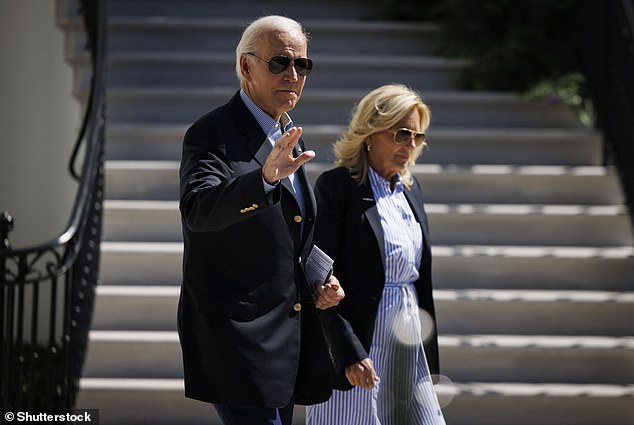
President Joe Biden and First Lady Dr. Jill Biden walk across the south lawn of the White House on September 2, 2023
Will the mask mandates be reinstated?
While some individual companies and universities have introduced mask requirements, there is no indication that state or federal mask mandates will return.
Morris Brown College in Atlanta, Georgia, has reintroduced the 14-day mask requirement for students and staff just days after classes began late last month.
The college also banned parties and major student events on campus and conducted temperature checks.
In addition, a recent editorial from the American College of Physicians called for mask mandates to return to healthcare facilities. A Kaiser Permanente hospital in California and several hospitals in upstate New York have reinstated their mandates for at least several weeks.
Hollywood movie studio Lionsgate also briefly reinstated the mask requirement last month, before quickly reversing its decision.
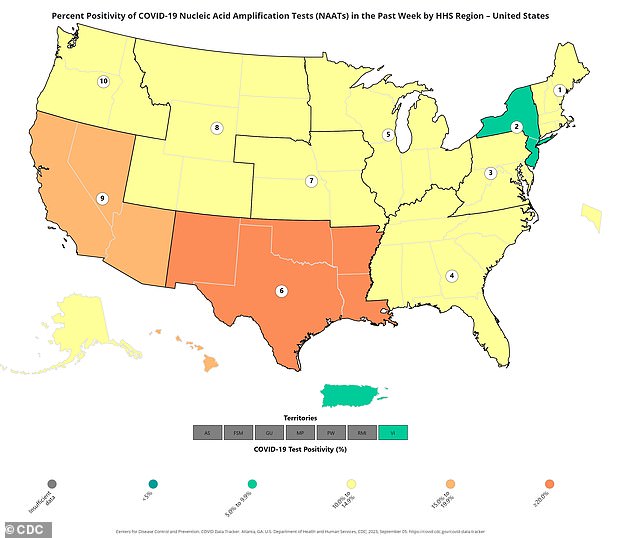
The above map shows the percentage of Covid test positivity by US region for the week ending August 26
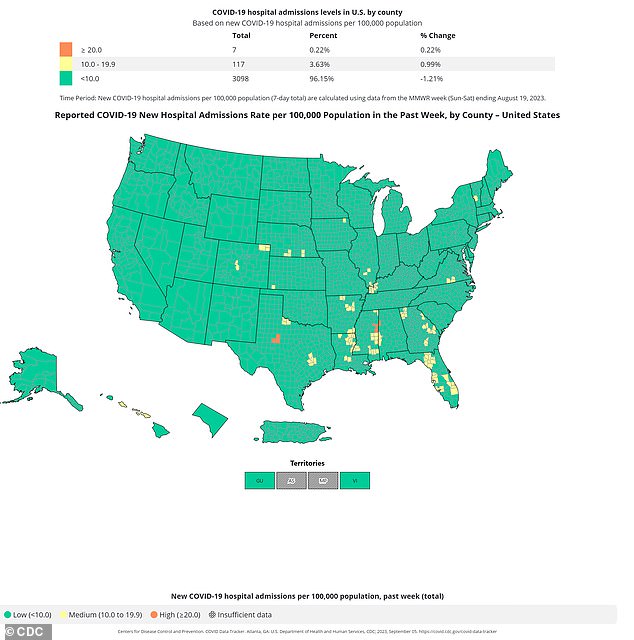
The above map shows the weekly number of hospitalizations due to Covid-19 by US county for the week ending August 19.
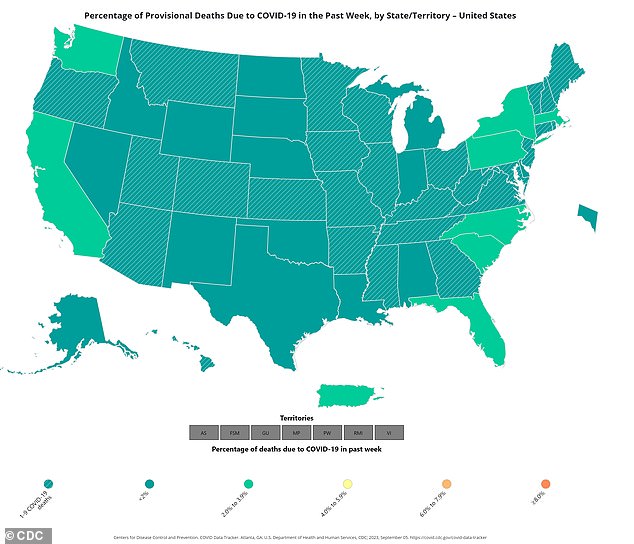
The maps above show the percentage of deaths from Covid by state during the week ending August 26
Do I have to isolate if I test positive for Covid?
People are encouraged to do so, but there is no legal obligation.
According to the latest guidelines from the Centers for Disease Control and Prevention (CDC), from May 2023, people who test positive for Covid and show symptoms should self-isolate and keep separate from others for at least five days.
They must also wear a high-quality mask around others for ten days, or until they get two negative tests 48 hours apart.
Someone with Covid must also inform anyone they have had close contact with recently that they have tested positive for the virus, although no one is required by law to report whether they have tested positive for the virus.
Health authority recommendations are not changing based on Covid hospitalizations.
Do I have to stay off work?
There is no legal requirement, but people are encouraged to take sick days if they are sick with Covid.
Before May, several states forced employers to provide an additional amount of paid time off for reasons related to Covid — to help employees follow mandatory quarantine periods.
But those rules have lapsed in several jurisdictions.
For example, California’s additional paid sick leave for COVID-19 ended December 31, 2022.
However, some jurisdictions, such as New York State, still have COVID-19 sick leave laws that require employers to provide separate paid time off beyond what an employee might otherwise be entitled to under a state or local law on paid sick leave or an employer policy, for certain employee needs related to COVID-19.
Should I test if I have been exposed to Covid?
Current CDC guidelines recommend that people exposed to Covid wear a mask as soon as they learn they have been exposed.
They must continue to wear a mask for ten days and be tested for the virus five days after exposure.
Even if the result is negative, the CDC says people should continue to wear a mask in public and around others for 10 days because symptoms can still develop.
If a person tests positive, they should be isolated immediately.
Tests for Covid-19 have long been available for free and covered by government and private health insurance.
However, with the Biden administration ending the public health emergency in May, health plans are no longer required to cover tests and no longer send free test kits from the government, meaning that Americans may have to pay for their own Covid tests.
However, some insurers may still choose to cover testing.
What are my chances of becoming seriously ill or dying from Covid?
While the number of Covid cases in the US is increasingAccording to public health officials, the majority of people experience mild symptoms similar to a cold or flu.
In addition, the CDC believes that the hospitalization rate of Covid patients is low and the weekly death rate is near an all-time low.
There were more deaths in the week ending Aug. 19 due to Alzheimer’s disease, which killed more than 1,649 people, diabetes, which accounted for more than 1,107 deaths, and cancer tumors, which killed more than 8,796 people, according to the study. CDC’s preliminary weekly counts of deaths by state and selected causes.
Are the number of cases, hospitalizations and deaths rising?
In recent weeks, public health authorities have observed an increase in positive Covid tests and hospitalizations. However, over the past month, deaths from Covid have declined.
According to the most recent data available, there were about 4.5 new hospitalizations per 100,000 people in the U.S. in the week ending Aug. 19, according to the CDC.
The CDC considers this a low rate, nearly 10 times lower than at the peak of hospitalizations in January 2022.
The Covid death rate per 100,000 people in the week ending August 26 was 0.1, compared to the highest rate of 7.8 per 100,000, recorded in January 2021.
Covid now accounts for about two percent of all deaths in the US, up from its peak of 30 percent in January 2021.
While these numbers are promising, the elderly, those with co-morbidities or those with weakened immune systems are still at high risk of contracting the virus and suffering from potentially dangerous complications. They must take precautions during the upswing.
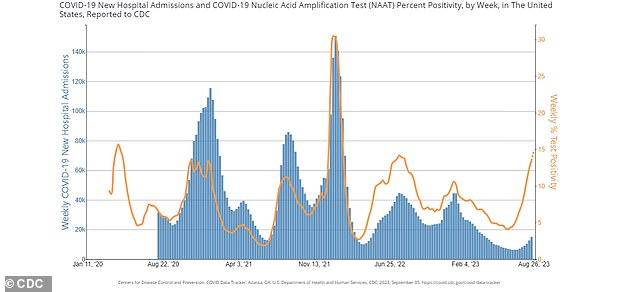
The chart above shows the weekly rate of Covid test positivity (orange line) and weekly Covid hospitalizations (blue bars) in the US during the pandemic as of August 31.
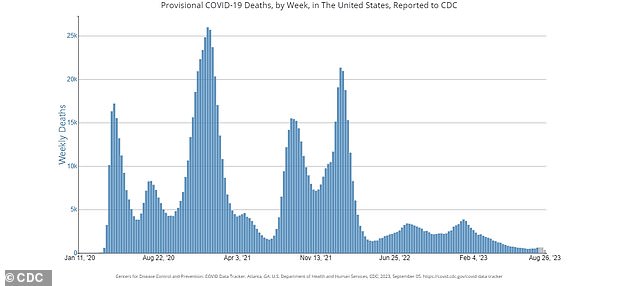
The chart above shows the weekly deaths from Covid in the US during the pandemic as of August 31
Do I need another Covid vaccine?
Doctors are advising people to wait to buy a new Covid booster until an updated version is available, which should be mid to late September.
Two variants driving the wave, EG.5, or Eris, and BA.X, or Pirola, are highly mutated and doctors say they would be better off bypassing current vaccine immunity.
Medical experts say people who are not immunocompromised or extremely vulnerable should delay immediate booster treatment until the fall to maximize the protection afforded by the updated vaccine.
Vaccine manufacturers, such as Moderna, are updating their vaccines to better protect against the new strains.
Health officials say the new boosters, formulated from subvariants of the omicron strain, have been shown to provide significant antibodies against some of the circulating variants.
Vaccines are currently free for most Americans with private or federal health coverage and for the uninsured.
The US government has paid about $26 per dose of the vaccine, but some manufacturers, such as Pfizer and Moderna, plan to raise the price to $130 when the vaccines go on sale in the private market this fall.
This price hike will be especially concerning in the fall, when the federal government plans to shift distribution of Covid vaccines to the commercial market, meaning manufacturers can sell their updated vaccines directly to healthcare providers instead of the government.
Federal and corporate programs plan to help uninsured Americans pay for the vaccine if they want to receive one, and Pfizer and Moderna plan to establish patient assistance programs.
